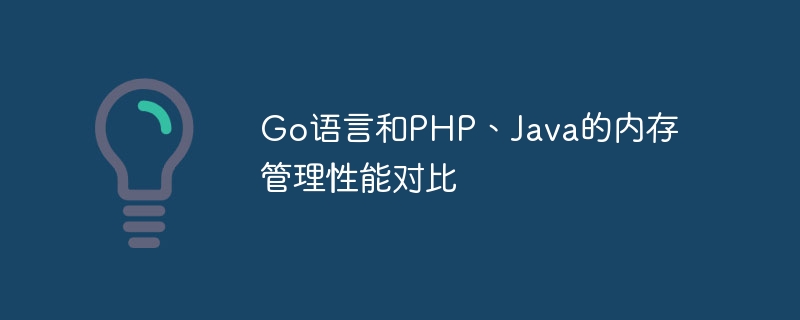

When it comes to choosing a programming language, performance is often an important consideration. In modern software development, memory management is a key aspect that has a significant impact on language performance and efficiency. This article will discuss the comparison between Go language, PHP and Java in terms of memory management performance.
Go language is a static, compiled programming language developed by Google. Its design goal is to provide a simple, efficient, and reliable programming language to meet the needs of large-scale distributed systems. To achieve this goal, the Go language provides a mechanism called "garbage collection" to manage memory.
Garbage collection is an automatic memory management technology that automatically detects and cleans up memory that is no longer used to provide higher memory utilization and more stable system performance. The garbage collection mechanism of the Go language uses an algorithm called "mark-sweep", which detects objects in memory at runtime and marks objects that are no longer used. The garbage collector then cleans up and reclaims the marked objects so that their memory can be reused.
In contrast, PHP and Java use different memory management mechanisms. PHP uses a mechanism called "reference counting" to manage memory. It detects objects that are no longer used by counting the number of times each variable is referenced, and frees the object's memory when the count reaches zero. However, the reference counting mechanism is susceptible to circular references, leading to the risk of memory leaks.
Java uses a mechanism called a "garbage collector" to manage memory. The garbage collector uses a series of algorithms to detect and recycle objects that are no longer in use. The most commonly used algorithm is called "mark-sweep" algorithm, which is similar to the garbage collection mechanism of Go language. However, Java's garbage collector has some performance limitations, especially when dealing with large numbers of objects.
In terms of memory management performance, the Go language has some obvious advantages over PHP and Java. First of all, the garbage collection mechanism of the Go language can manage memory more effectively and avoid the risk of memory leaks. Secondly, Go's garbage collection mechanism performs better when dealing with large numbers of objects because it has lower pause times and better memory utilization. Finally, the compiler and runtime system of the Go language are also relatively excellent in terms of performance and can provide more efficient program execution.
However, PHP and Java also have their own advantages in some aspects. PHP is a scripting language. Compared with Go language and Java, its runtime performance is lower, but it is very convenient for some simple web application development. Java is a cross-platform programming language that is widely used in large-scale system development and enterprise-level applications, with richer library and framework support.
In short, the Go language has certain advantages over PHP and Java in terms of memory management performance. However, the choice of programming language should be based on specific needs, and performance alone is not enough. Different programming languages have their own characteristics and application scenarios in their respective fields. In actual development, multiple factors need to be fully considered to choose the most appropriate language to meet the needs of the project.
The above is the detailed content of Comparison of memory management performance between Go language, PHP and Java. For more information, please follow other related articles on the PHP Chinese website!